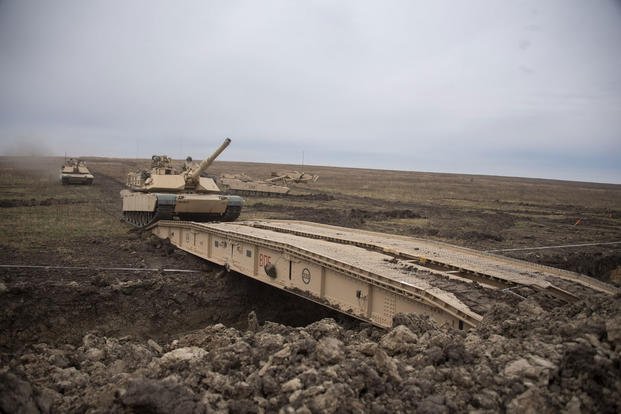The U.S. Army just finished operational testing of a new, mobile assault bridge, designed to cross battlefield barriers. It is scheduled to be fielded to the first combat troops next year.
Soldiers from the 1st Infantry Division's 1st Armored Brigade Combat Team out of Fort Riley, Kansas, completed Initial Operational Test & Evaluation (IOT&E) of the Joint Assault Bridge (JAB) in November at Fort Hood, Texas, and will be the first unit equipped in March, according to a news release from the Army's Program Executive Office Combat Support and Combat Service Support.
The JAB is built on an M1 Abrams tank chassis and features a hydraulic launching mechanism for deploying the Heavy Assault Scissor Bridge, which is capable of extending across gaps and trenches on the battlefield. It measures approximately 60 feet wide.
Read Next: Fort Hood Crisis Highlights Widespread Army Problem: A Shortage of Experienced Enlisted Leaders
The JAB is designed to replace the Armored Vehicle Launched Bridge (AVLB), which is built on the slower, M60A2 tank chassis.
"The Joint Assault Bridge is important to the Army because it replaces an aged fleet of assault bridging that the Army can no longer sustain," Shawn Howley, deputy commandant of the U.S. Army Engineer School at Fort Leonard Wood, Missouri, said in the release.
"The M60A2 tank chassis is the foundation of the 30-year-old Assault Vehicle Launched Bridge system, and parts are difficult to find. It is important to have a base platform like the M1 chassis with common parts with the armor community," he added.
During the 11-day IOT&E, soldiers from 3rd Battalion, 66th Armor Regiment, and 1st Engineer Battalion, 1st Armored Brigade Combat Team, conducted more than 40 natural gap crossings and 22 combined-arms breaches of complex, anti-vehicle tactical obstacles, according to the release.
"Gap crossings and breaching operations are complex missions that require our engineer assets to work in concert with maneuver [forces]," Capt. Mitchell Ables, Bravo company commander, 1st Engineer Battalion, said in the release. "The JAB allowed us to maintain tempo throughout."
The JAB didn't do so well during its first attempt at IOT&E in April 2019, when it experienced reliability issues related to the hydraulic system and training, Defense News reported in February.
IOT&E is the final step in moving a program into full rate production, according to Timothy Goddette, the head of PEO Combat Support & Combat Service Support.
It's conducted on "production-representative equipment to determine if the systems are operationally effective and suitable before fielding to our soldiers," Goddette said.
The Army plans to field the JAB between fiscal 2021 through fiscal 2027, Elizabeth Miller, the service's product manager for Bridging, said in the release. In addition to the 1st ABCT of the 1st ID, the 278th Armored Cavalry Regiment's Brigade Engineering Battalion, Tennessee Army National Guard, is slated to receive JABs in mid-2021.
-- Matthew Cox can be reached at matthew.cox@military.com.
Related: Army Set to Receive First Armored Vehicles to Replace Vietnam-Era M113













